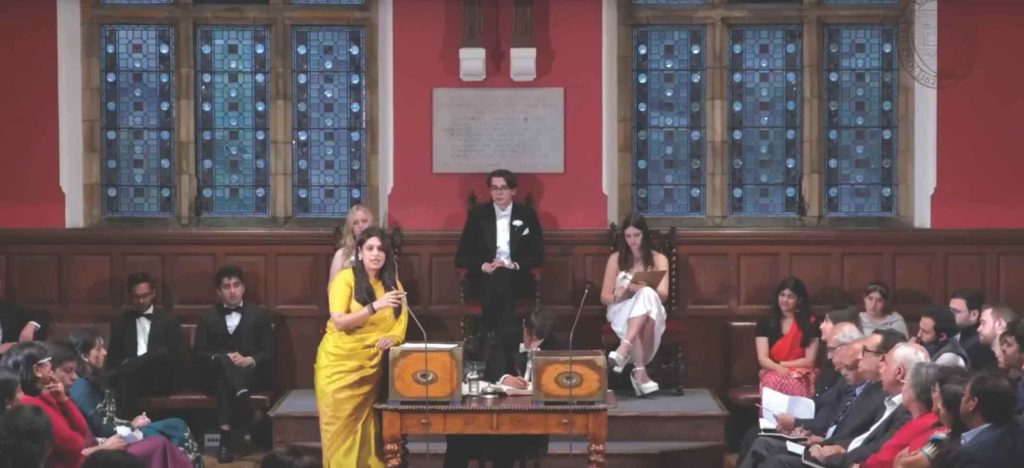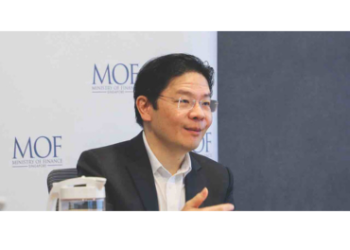The world is interested in India’s growth agenda. There is much conversation on whether it is the right one. Debating the same at the Oxford Union saw many Indians defending their country and their leader. That was almost one year ago. Today, as India conducts general elections, the Oxford Union debate has come to the forefront, with Indian journalist Palki Sharma’s fierce defense of her country drawing much attention when she asserted that every country has its path, telling the audience not to judge India or any country on the boundaries of another.
Words Jennifer Paldano Goonewardane.

Indian journalist Palki Sharma at Oxford Union debate.
Nearly one year later, a video of Indian journalist Palki Sharma defending India at the Oxford Union on the motion ‘This House believes that Modi’s India is on the right path’ had managed to capture Prime Minister Narendra Modi’s attention who lauded Sharma on X for articulating India’s success story among a distinguished audience in the august halls of Oxford.
The debate took place in June 2023 which had the team supporting the motion consisting of Indian foreign affairs journalist Palki Sharma, the founder of the Deshbhakt, India’s most prominent political satire platform, Akash Banerjee, Parliamentary Under-Secretary of State for International Development Baroness Sandip Verma, and then Oxford Union President-elect Disha Hedge. The team opposing the motion included All India Kisan Sabha and member of the Polit Bureau of the Communist Party of India, Ashok Dhawale, and the former Indian Minister of Housing and Urban Poverty Alleviation, Ajay Maken, co-founder of the Aam Aadmi Party and later of Swaraj Abhiyan, Prashant Bhushan, and Oxford Union’s Ethnic Minorities officer Misha Mian.
Since Sharma’s speech went viral recently, her bevy of supporters have praised her for speaking on behalf of India. Some consider her a symbol of modern India’s empowered women. At the end of her nearly fifteen-minute speech, it’s clear that Sharma was not there to boost Modi by defending his policies. However, instead, she was taking a stand for her country, defending India’s development narrative against Western naysayers, disputing the belief that only the time-tested Western model of development is the right path. Her defiant stand at the Oxford Union mirrored the changed circumstances at home. The patriotism and pride of being Indian came out strongly from Sharma, who wanted to drive home that India was already a formidable nation and was on its way to becoming a superpower. She flaunted things synonymous with the Indian identity with pride, Bollywood, masala chai, Yoga, and cricket. She went as far as saying that Indians are no longer coy about displaying their passports when traveling, indicating how prosperity at home has made Indians confident outside. It was a message that resonated well with the base of telling the world not to belittle India and its ways, its culture and habits, and its beliefs. Her words echoed the confidence with which the country is moving ahead, Indian-ness entrenched on their soil and universally wherever its people choose to serve and live.
She said the evidence supports Modi’s India being on the right path. Having lived through India’s different periods of development, defined as wary and at times self-doubting, then at other times brimming with exciting policies and positions only to be abandoned, eras that policymakers relied sloppily on global opinion to shape India’s domestic journey, Sharma defined modern India as a country where the world comes for leadership and inspiration. No longer is India a timid democracy that tolerates terrorism or betrayals, a confidence unlike before spurred by the growth at home, which has made the world’s fifth-largest economy decisive and cognizant of its role in the world. Since embarking on its growth trajectory based on Modi’s ‘India first’ policy, India has seen 140 million people exit multi-dimensional poverty, achieved over 50 percent in financial inclusion and internet penetration of its population, and increased airport traffic of 154 million in the 2023-24 financial year. The country has seen 110 million new gas connections, 470 million bank accounts, and 220 million insurance beneficiaries.
As a welfare state, India continues to support its people with a considerable provision but has a new approach to delivering welfare; beyond merely filling pockets and distributing handouts, the focus has been empowering them through welfare programs by ensuring that they channel them for intended purposes. That is where India’s impressive digital public infrastructure has enabled the disbursement of welfare in an efficient and orderly manner, a departure from the norm of welfare programs being a weapon for politicians to wield influence among their constituents to increase their base and chances at future elections.
Sharma based her argument on evidence, contrasting India’s growth in per capita income from 86,000 rupees in 2014 to 172,000 rupees today (June 2023) with the global cost of living crisis that has stymied incomes and thrust people into poverty and new living conditions, a feat that India achieved by managing its inflation, reducing it by two percentage points from eight percent to six today.
Accompanying India’s triple development achievements is its overwhelming focus on connectivity for growth, and in keeping with that commitment, Sharma revealed that India builds 38 kilometers of highway every day, 50 percent more than it did seven years ago. The country’s seaports have doubled their cargo capacity, while its airports have risen from 74 to 140 since 2014.
On the global stage, she said India strives to play the proper role by being a friend to all, an example being the war in Ukraine, with India continuing to nurture its mutual friendship with Russia while continuing to deal with Ukraine. She said India’s stance bewilders the West but makes sense at home because taking sides is not in its national interest, likening India to a good friend who tries to talk sense when two of its good friends begin warring, thereby becoming part of the solution and not the problem. She debunked notions of Indian supremacy in the South Asian region and its power waning in the area today, claiming that South Asia was never India’s to control, that New Delhi builds relations based on mutual respect as demonstrated in its neighborhood policy, where Sharma highlighted her country’s benevolence towards Sri Lanka during the height of the economic crisis with a no strings attached assistance of four billion dollars despite the island’s closeness to China.
In the final analysis, Sharma asserted that the Oxford Union considered it essential to debate Modi’s India because her country had dared to defy Western predictions. She scoffed at the racist tag pinned on their government, stressing that random elements and sporadic incidents do not represent India, its leadership, or its government. If the Modi government stands accused of religious intolerance, then increasing scholarships to Muslim students and India’s Hajj quota debunk such allegations, with more than 89 percent of all Muslims and Christians in India saying that they have the freedom to practice their religions, as revealed in a Pew research. However, Sharma noted that even a single incident against a religious minority should not happen and that her country could do better to thwart such episodes. However, that alone cannot become the barometer for judging a country of over a billion people. Since abrogating Article 370 of the Indian constitution that gave autonomy to Jammu and Kashmir, the region has been thriving, as the government’s focus on security has reduced terror attacks and attracted 1.8 crore tourists to the valley in 2023, a historic highest for India, while Kashmir is getting its first ever foreign direct investment from a UAE company, justifying India’s role in ensuring domestic stability.
Sharma’s argument demonstrated to the audience the belief that India is poised for the long haul, no longer ready to listen to lecturing and virtue signaling and complying with Western constructs. She criticized those who stir anti-India narratives based on political leanings. She stressed the need to separate agenda-driven narratives from facts in judging a country’s path, adding that there is no perfect path to a country’s development; each country follows its distinct path to growth as long as every country respects democracy.
Information for this article was extracted from videos of the Oxford Union debate.






